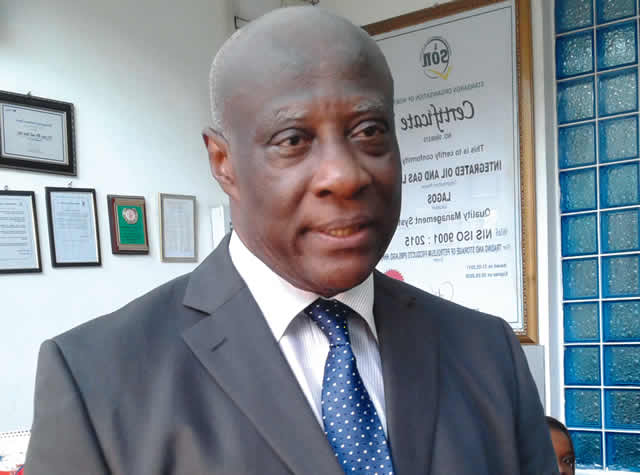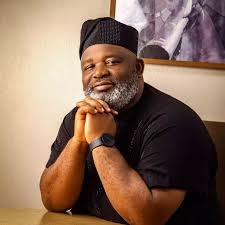Captain Emmanuel Ihenacho is a former Minister of Interior, a frontline shipowner, Master Mariner and Chairman/CEO of Integrated Oil and Gas. In this interview with Joshua Yousouph, he talks extensively on the challenges of ship ownership in Nigeria

What is the infrastructure that is lacking in the process of acquiring vessels?
The infrastructure is the ship. So, you can say that the infrastructure is lacking, there are no ships. But I want to address the issue of MAN, Oron. MAN, Oron is a very nice institution. It is doing very well and it is run well. But you see, it’s not achieving the objectives which it was established for. I’ve heard several times people suggesting that it would be a great idea if Oron were to be upgraded to become a university. Oron is not supposed to be a university. If somebody has a PhD in any discipline, maybe maritime for instance, he can’t work on a ship on the strength of that PhD. So, Oron is not going to be like a university, and people should stop asking that Oron be upgraded to a university. Oron is a maritime institution. Oron is supposed to produce STCW-capable officers. In the meeting that we went to on the day of the seafarers, and a young chap in white got up and said “we have our COC and they won’t take us”. Why would you have your COC and they won’t take you? Because COC is the same everywhere. You don’t have COC that applies to Nigerians and you have a COC that applies to people in a different type of country. The COC is the same everywhere. But what you cannot force people to do is their perception as to what you do to get your COC. So if you are beautifying Oron all the time and Oron has got a swimming pool that’s Olympic size. Oron has got lawn tennis courts; you don’t swim to become a seaman. You don’t play lawn tennis to become a seaman. So you’re developing a different culture entirely. So what people look at is, this man has COC from Nigeria. Where did he go? He went to Oron. He was swimming all the time. Do you blame them for jumping to the conclusion that you may not be able to endure the work on board a ship? So they look at all of those things.
There have been suggestions from stakeholders that training vessels should be purchased for MAN Oron.
Somebody actually got up that day and said, we should buy a ship for MAN Oron for training. Ships are not a necessary requirement in training schools. People can’t make the difference between a navigational training ship and somebody was suggesting that we bring a training vessel and give it to Oron. What would Oron be doing? Trading the ship or training people? It wouldn’t be able to do both. There is no where that I know where it is a requirement for you to have a training ship in a training establishment. It’s not required, but if you are very fortunate and you’re able to afford one small training ship for navigational runs; you run out and you run back in. That is it. You can’t trade it because you can’t carry anything in it.
Which among the options of ship financing has actually worked for Nigerian ship owners in the past and what do you suggest should be done to push it?
The answer to that is very simple. I will point to you and the time we were trying to get the SASBF. So if you remember what happened with the SASBF, I got two and a half a million dollars. General Danjuma got 500,000 dollars. Kola Daisi got a small amount as well. I can only account for my own because I bought the ship and brought it to be launched here. It was an old ship but that’s what two and a half million dollars could buy and I traded with the ship and everybody was listening to how we were trading including the story about the fish that collided with the ship and wedged in the bow of the ship in South Africa. It sounds like a story, but that is true. If they want to demonstrate that Nigerians were resourceful and manage what they have, if they are running a fair thing that I paid all my two and a half million dollars and sold the ship to scrap, they would have made sure that we got money that was more than two and a half million dollars, pay back and then also other people can then move in. If they did that, I would have better ships that would be operating. But they didn’t do that because they got frightened, they stopped, they are accumulating the money. You can see the money is still there about N700 Billion; not doing what it is supposed to do. People are agitating and asking that the money be released. And they have the right to ask that the money be released.
A former minister of Transport, Rotimi Amaechi said the SASBF is rested and no longer available as those who borrowed it refused to pay back. Do you think that is why the Government is skeptical in releasing the CVFF?
There have been lots and lots of stories, but people just don’t want to face facts. I’m alive. If you ask whether I paid back, people are there. I paid back the money. You know, I absolutely took a terrible beating in the press over that money, even when the money wasn’t there. Some people say they’ve collected their own share of the national cake. I never said I collected my own share of the national cake. I bought a ship that the money could buy, and I ran it and created job opportunities for so many years. At one time, I had seven ships. I created job opportunities for so many years, and when that programme went down, I expected them to say, they are embarking upon the next set of people. You know all these politicians say a lot and you don’t really understand what they’re saying most of the time. I was not there, so I don’t know what he (former minister) was talking about. But what I know is that I paid, some people paid and some people didn’t pay.
You said international banks are offering loan at a cheaper interest rate. So what is stopping Nigerians from getting these loans from the international banks?
You see, we talked about a guarantee of some sort. You have to have an asset. They can’t just let you have the money. If not, every Nigerian will come in for a piece. So on the issue of trust, Nigeria has a bad name. Anytime that you’re doing business and they see that it is a Nigerian, they stop it, so that is the issue. I’m telling you what competitors to Nigerian shipping companies are getting. Well, it doesn’t mean that we can get it. We can’t get it because we’re Nigerians. Nobody’s going to lend us that money.
So what is the difference between Cabotage and Coastal Vessels?
I made a distinction. I said, in Cabotage, you have Cabotage vessels that participate in moving oil back and forth. These are the proper Cabotage vessels. You have vessels that are working offshore and they don’t move any goods in that sense; that is moving goods from one port to another and we lump them all up as Cabotage. Those are not Cabotage vessels. Those are coastal vessels. We haven’t made a distinction between Coastal vessels and Cabotage vessels. Those who have borrowed money to buy those coastal vessels are actually doing well because they don’t buy second-hand vessels mostly. They go and bring ships in China. Not too long ago, that is about a year or two ago, we went to launch a ship in Naval Dockyard and that ship cost, I think, only $12 million. It was an awesome-looking craft. Now, you won’t get that vessel for less than $20 million. But those ones work. Because they bought, they gave them money to buy those ships and they leveraged on that, the availability of that, to go and get contracts. And if you get a contract offshore, then the money is flowing. So, as far as I understand, those ones worked. But the tanker one that we absolutely wanted to is an aberration.
For instance, in the NNPC system, we were competing against Greek ship owners who were renting ships to NNPC. The person in charge of the shipping in NNPC now is a Greek Man including NNPC Trading also.
Is that allowed?
Well, yes, it is allowed because people are doing it and getting away from it.
We are still facing the challenge of lack of ship building yards in Nigeria
It can be done. All they have to do is set a project up. To say we want to build a 10,000 ton tanker. So you start. Where are you going to build it? You could have actually used the existing Nigerdock. But if you don’t use Nigerdock, you could build a dock. There are lots of places. But you start. You call the Koreans. Nigerians work with them in the design team and the welding team. They build the ship and they launch it. If you don’t do it, do you expect those people will leave the job that they are doing and making money and then carry your people to go and teach them? They will not teach them. You have to force them to do it. We have different levels of technical sophistication. We have reached the level where we should be catering for all the countries in West Africa. If they need a ship, we could build it for them. But if you don’t start the programme and we are buying things all the time, we are going to be a country of fools forever and ever.















